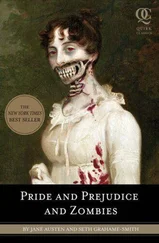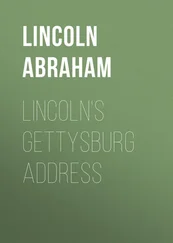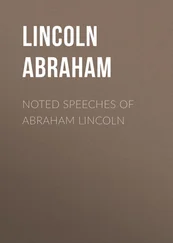“Abraham,” he said. “I’m pleased to see you alive, old friend.”
“And I to see you dead.”
Henry smiled. He tore a sleeve from his shirt and held it to Abe’s chin to slow the bleeding, while his companions attended to Lamon and Speed (who were shaken up but otherwise unharmed).
The Union had been given false information by a traitorous spy—information meant to lure me to my death. Henry and his allies did not learn of this treachery until after we left Springfield. With no means of getting word to us (for we traveled under false names), they rode for two days and nights to head us off, while sending word to the trinity to have Mary and the boys placed in hiding.
“And you’re sure they’re safe?” asked Abe.
“I’m sure they’re in hiding, and protected by three of my most cunning, most vicious allies,” said Henry.
It would suffice. Abe knew that the trinity took their work seriously.
“Henry,” he said after a long pause, “I was certain that I was going to—”
“I told you, Abraham… it wasn’t your time.”
It would be the last hunt of Abe’s life.

On November 6th, 1860, Abe sat in a cramped telegraph office in Springfield.
The tide of well-wishers and appointment seekers had risen to unbearable levels as the election approached. When the 6th came at last, I declared that I wished to see no one until all the votes were in. My only company was to be the young [telegraph] operator. If the outcome was the one I and my supporters expected, there would be few peaceful days in the coming years.
He’d grown a beard for the first time in his life to conceal the scar on his chin. *It gave his face a fuller, healthier appearance. “More distinguished,” as Mary said. “A face befitting the next president.”
Mary was, at first, quite opposed to my running—having not enjoyed her previous time in Washington, and being all too aware of the time such an endeavor would require of me. As my campaign met with increasing success, however, her position began to change. I suspect that she rather enjoyed the well-wishers who came to our door at all hours; the wealthy couples who invited us to their homes for dinner; and the lavish events thrown in my honor. I suspect that she began to see the many social possibilities of being married to the president of the United States.
As the returns began to trickle in over the telegraph wires that Tuesday evening, it seemed more and more certain that Abe would be just that.
I admit it came as little surprise, for I believed that the Union would see to my victory—whether earned or not. **
I could therefore feel none of the honor that had accompanied my being elected captain by my fellow soldiers. The weight of the thing was immense. The challenges and miseries ahead unknowable and numerous.
Henry’s telegram had been one of the first to arrive that morning—long before a single vote had been counted.
CONGRATULATIONS MR PRESIDENT EVER H
IV
President Elect Abraham Lincoln’s journey to the White House began in Springfield on February 11th, 1861. A private train was ordered to shepherd Abe, his family, his close associates, and his private security detail to Washington, D.C.
It hadn’t been an easy transition.
Just over a month after the election, South Carolina’s legislature voted to secede from the Union. One by one, more Southern states followed—seven in all by Inauguration Day: Louisiana, Mississippi, Alabama, Florida, Georgia, South Carolina, and Texas. Abe could only watch as President Buchanan did nothing to stem the crisis.
[Buchanan] continues to rest on his rump as the country comes apart. As the ships of our navy and forts are daily surrendered to the South, and the Union dissolves before our eyes. His weakness astonishes. It seems clear that he has decided to kick this crisis down the road. I, on the other hand, am very much looking forward to kicking him onto Pennsylvania Avenue.
Three days before Abe’s train left Springfield, the self-proclaimed “Leaders of the Southern People” met in Montgomery, Alabama, to formally adopt a constitution and announce the Confederate States of America.
They chose Jefferson Davis as their president.

Abe’s trinity patrolled the train day and night. Officially, they were “detectives” from Springfield who’d volunteered to look after the new president. His security detail also included a pair of humans—a detective named Allan Pinkerton and his old friend Ward Hill Lamon. Lamon had volunteered to be Abe’s bodyguard out of nothing more than friendly concern for his safety. He was one of the few around the new president who knew the gravity of the threats he faced. In the coming years, White House staff would grow used to seeing Lamon patrol the White House grounds after dark, or sleeping in front of the door to the president’s bedroom. He was big, tough, handy with a gun, and fiercely loyal—and his help was desperately needed.
Abe’s train was scheduled to stop in at least ten major cities on the way to Washington. In each one, thousands (if not tens of thousands) of locals came in hopes of seeing the new president with their own eyes. Abe would often make an impromptu speech from the rear car—sometimes only inches from those who’d packed in to hear him speak. He would then leave the stations by coach to meet with local leaders, attend banquets, or watch parades in his honor. It was a security nightmare.
It has been an overwhelming several days. The boys are in fine spirits, though—running about the train, watching the country roll by through its windows. Bob finds it “all so very exciting,” while Willie and Tad seem not the least bit affected by the crowds, or by the presence of so many new faces. Mary, too, seems to be taking it all in stride, though her head has been especially bothersome this trip. *
For all the excitement, there was a conspicuous tension hanging over the train. Everyone on board felt it, though no one spoke of it openly.
There are some who have sworn that I shall never live to see the White House. Such talk breeds grave concern (an appropriate kind given the subject) on the faces of my protectors. I, however, can honestly say that it costs me not one nickel of sleep—for I have known death my entire life, and have come to regard him as something of an old friend. Of course, Mary is roused to great anxiety by these rumors (but then, she is roused to great anxiety by a great many things). So long as our boys hear nothing of it, I am content.
The trip continued without incident for ten days, through Indiana, Ohio, New York, New Jersey, and Pennsylvania—and it began to seem that all the talk of assassination was just that. But on February 22nd in Philadelphia, Abe received an urgent visit from William Seward’s son, Frederick. He came bearing a sealed letter.
Dear Mr. President Elect,
Our mutual acquaintance wishes it known that a plot has been discovered in Baltimore. Four men will stab and shoot you to death when you change trains at the Calvert Street Station. He thought it best you should be aware of this, so that you may take every precaution against it.
Yours,
—Wm. Seward
It was decided that Abe, accompanied by Pinkerton and Lamon, and wearing a hat and cloak to conceal his identity from the other passengers, would take a separate train through Baltimore directly to Washington. Pinkerton and Lamon would be armed, Abe wouldn’t.
This caused quite a squabble, I recall. Lamon (who knew me to be proficient with such weapons) insisted I be given a revolver and a long knife. Pinkerton refused. “I will not have it said that the future president of the United States entered the capital armed!” The two nearly came to blows over the matter, until I offered a compromise: Lamon would carry two of each weapon, and would give them over only if we came under attack. It was agreed to, and we prepared to be off.
Читать дальше













